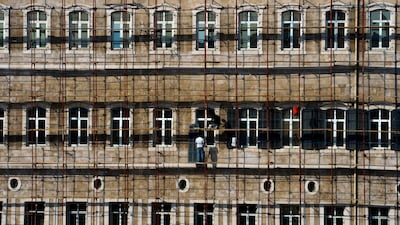More than two weeks after Nawaf Salam was designated as Lebanon's next Prime Minister, the extensive and complicated consultations that lead to the creation of the country's cabinet continue.
It's the highly coveted Finance Ministry – whose head in recent years has been named by parliamentary speaker Nabih Berri – that is proving most controversial.
Historically, the ministry has been held by ministers aligned with Hezbollah and the Amal Movement. Allocating the ministry to them again would likely spark controversy, as Lebanon aspires to usher in a new era under a president and prime minister seen as independent from the entrenched ruling elite widely blamed for the country’s many crises.
Mr Salam is seen as a newcomer and a break from the traditional political system. The work of Change MPs – lawmakers who emerged after the October 2019 protests against Lebanon's ruling elite – was instrumental in his appointment.
On Wednesday night, after meeting with President Joseph Aoun, Mr Salam reiterated his government would not be comprised of MPs or figures from political parties. He insisted that no decision had been made, adding “no ministry is exclusive to a certain sect and no ministry is prohibited to a certain sect”.
But a key obstacle remains the Finance Ministry.
Mr Berri, leader of the Amal Movement, insists the Finance Ministry has been historically reserved for the Shiite community – whose parliamentary representation comes from Hezbollah and Amal. He said this week that his party's choice is Yassine Jaber, a former minister of economy and financial expert.
A senior parliamentary figure close to both parties said that Mr Jaber is not a member of Amal. He pointed out that he is also not an MP, which would not affect his chances of becoming a minister, under Mr Salam's conditions.
However, such a move by Mr Berri and his allies has been met with short shrift by opponents, riding on a wave of optimism.
“Let me be frank. It is not normal to not apply the same rules to everyone. When you do a shuffling of the ministers, you have to have no exceptions,” said Samy Gemayel, leader of the Kataeb, one of Lebanon's oldest political parties.
“Any privilege given to anyone is a door for discrimination and a door for people to feel that they are not equals,” he told The National. “So, based on that, we are clear that we should not give the financial keys of the government to Amal and Hezbollah.”
Imposing conditions
The election of Mr Aoun on January 9, following a two-year presidential vacuum, was influenced by pressure from the US, France and Saudi Arabia. Lebanon urgently requires financial support to tackle an economic crisis that began in 2019, further exacerbated by the destruction caused by a war between Hezbollah's military wing and Israel, which inflicted billions of dollars in damage.
A ceasefire deal to end the conflict, reached in November last year, needs strong leadership to ensure it holds.
On Wednesday, caretaker Economy Minister Amin Salam said Lebanon must regain the trust of the international community to unlock financial aid for reconstruction after the war between Hezbollah and Israel.
Opponents of Hezbollah and Amal are resisting attempts by the parties to impose candidates on any ministry − not just the finance portfolio − accusing them of having a stranglehold over a government that has persisted longer than a decade. Some 84 out of Parliament's 128 MPs voted for Mr Salam; Hezbollah and Amal abstained after seeing that their choice, incumbent Prime Minister Najib Mikati, would not win.
“Since the beginning, there was a group of people who voted for Nawaf Salam against the will of another group. Hezbollah didn't vote for Nawaf Salam, nor [did] Mr Berri. And the others did,” said a senior political source from the faction who voted for Mr Salam.
“We were in agreement that no party will impose on Mr Salam any portfolio or any case or any condition.”
“It's not acceptable that the people who chose Mr Salam to lead a government of reform and sovereignty will end up losing in front of people imposing conditions who don't support his agenda,” added the source.
The source insisted it was not “about the Finance Ministry, it's about a certain party imposing its conditions on the Prime Minister and the President of the Republic against the discipline of the other parties”.


